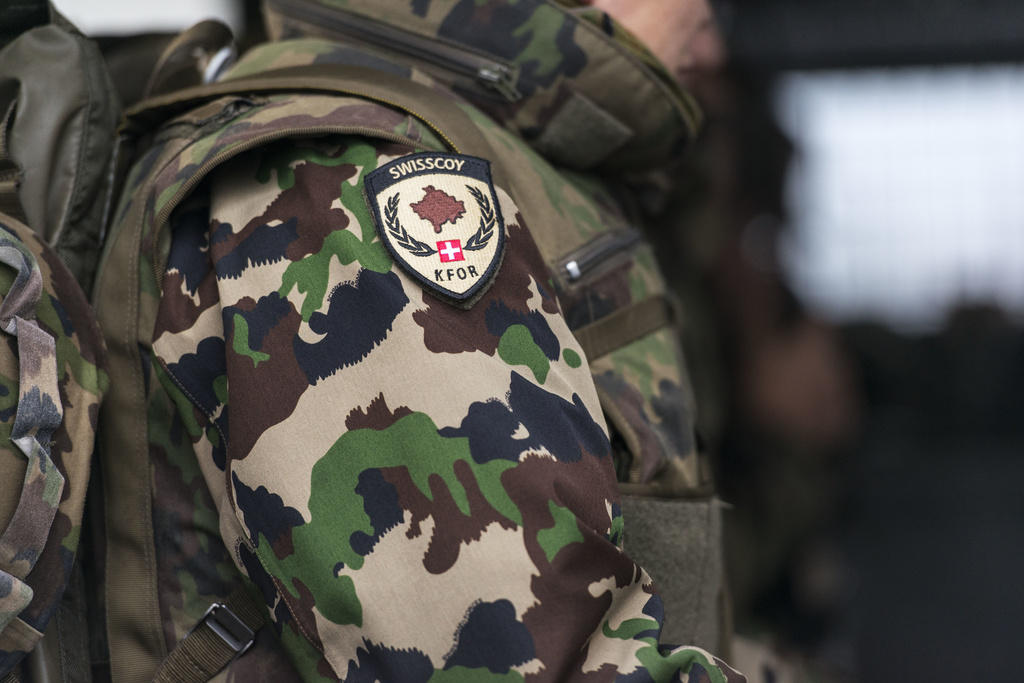
Switzerland and NATO: engaged but not married

The North Atlantic Treaty Organization (NATO) is celebrating 70 years of its creation this Thursday. Switzerland has been collaborating with this defence organisation for more than 20 years but membership is out of the question for reasons of strict neutrality.
Although it also deals with certain political aspects, NATO is above all a military alliance that was created in the context of the Cold War. The aim was to protect small states and Western democracies from an invasion by the Warsaw Pact countries.
Switzerland also feared a Soviet invasion but did not want to be part of NATO. Indeed, membership would be incompatible with its traditional policy of neutrality.
“It is above all Article 5 of the Treaty which is incompatible with neutrality. It obliges signatory states to intervene if one of them is attacked,” explains Alexandre Vautravers, of the University of Geneva and editor-in-chief of the Swiss Military Review.
However, abstaining from NATO membership did not stop collaboration. Since 1996, Switzerland has been a part of NATO’s Partnership for Peace External link(PfP). It is a “flexible cooperation instrument” between NATO and different partners.
According to the Swiss Department of Foreign Affairs, the PfP is important for Switzerland as it “provides an institutionalised framework for conducting a dialogue on security policy with the countries in its strategic environment”. In addition, the PfP “contributes to the preparation of the Swiss armed forces for peace support operations under the direction of NATO, the EU or the UN”.
Not everyone shares this vision. Several voices – in both left and right-wing circles – believe that the PfP is incompatible with neutrality and constitutes an indirect membership of NATO. These criticisms come from the Group for a Switzerland without an ArmyExternal link, the Action for an Independent and Neutral Switzerland External linkand members of the conservative right Swiss People’s Party.
An essential partner
Is the PfP a gateway to NATO?
“There are several stages in the history of the PpP. Originally, it was clearly a hand extended to neutral countries and former members of the Warsaw Pact. Over time, they have indeed gone on to join NATO, like Hungary or Bulgaria,” says Vautravers.
Today, the PfP remains a simple platform for collaboration between neutral Western European countries (like Switzerland, Austria and Ireland) with Eastern and Central Asian countries (Albania, Russia, Ukraine, Uzbekistan, etc.). Vautravers does not see this as incompatible with neutrality.
“If the PfP is seen as a ladder leading to NATO, neutral countries have had the opportunity to stop at the first rung and not go any further,” he says.
According to him, NATO remains an almost indispensable partner.
“NATO accounts for more than 70% of global military spending. If we want to set standards, for example in the calibre of ammunition, the organisation joint force commands, a rapprochement with NATO criteria is inevitable, whether we like it or not.”
On April 4, 1949, in Washington, ten European countries (United Kingdom, France, Portugal, Denmark, Netherlands, Belgium, Luxembourg, Iceland, Norway and Italy) concluded an alliance with the United States and Canada. The objective was threefold: to “contain” the Soviet Union and its allies, to allow Germany to regain autonomy and integrate it into the Western Bloc, and to maintain an American presence and its nuclear “umbrella” over Europe.
The organisation expanded in the 1950s by integrating Greece, Turkey and Germany, then Spain in the 1980s. But it was the fall of the USSR in 1991 that brought most growth with most eastern European states signing up. NATO now has 29 members.

More
Parliament extends Swiss peacekeeping mission in Kosovo

In compliance with the JTI standards
More: SWI swissinfo.ch certified by the Journalism Trust Initiative






























You can find an overview of ongoing debates with our journalists here . Please join us!
If you want to start a conversation about a topic raised in this article or want to report factual errors, email us at english@swissinfo.ch.